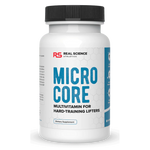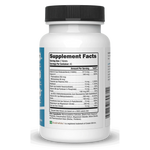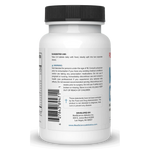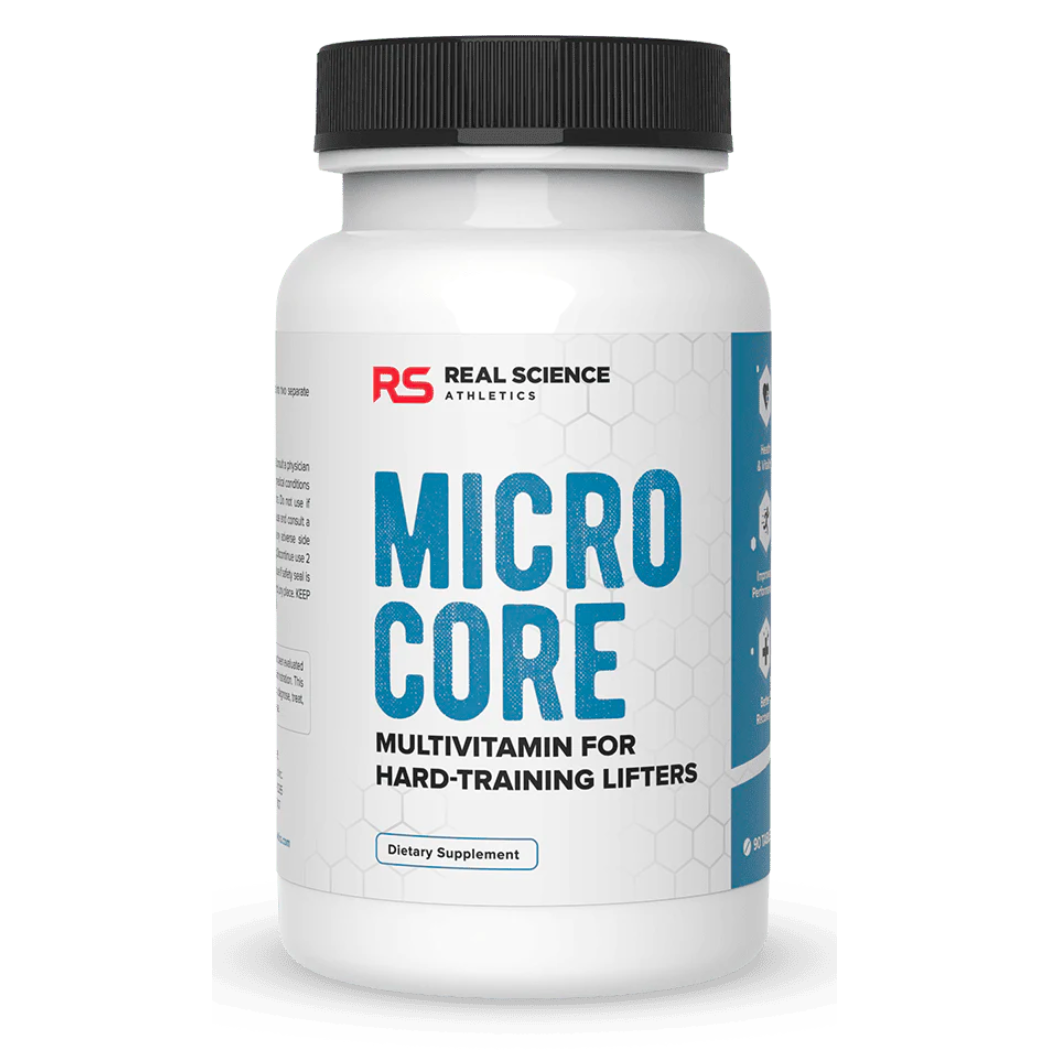
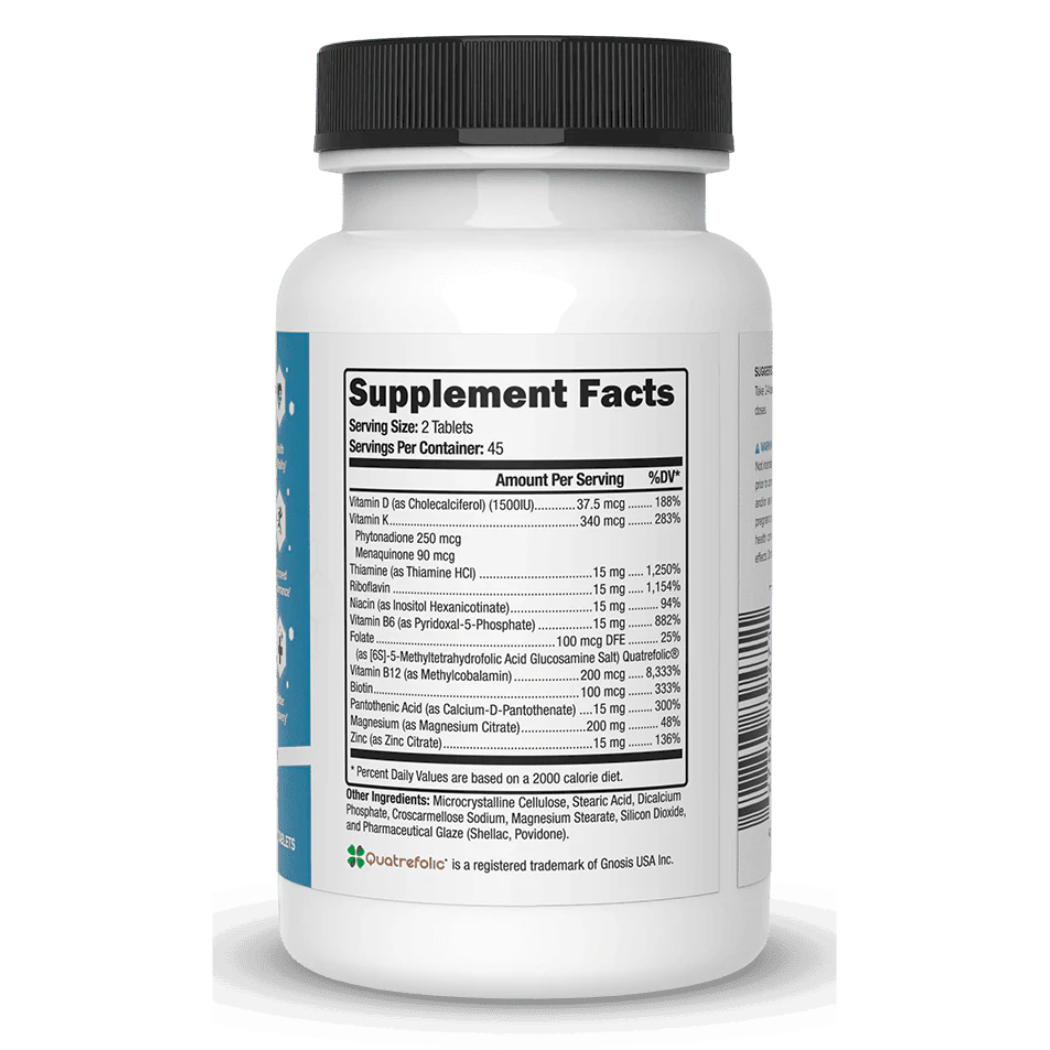
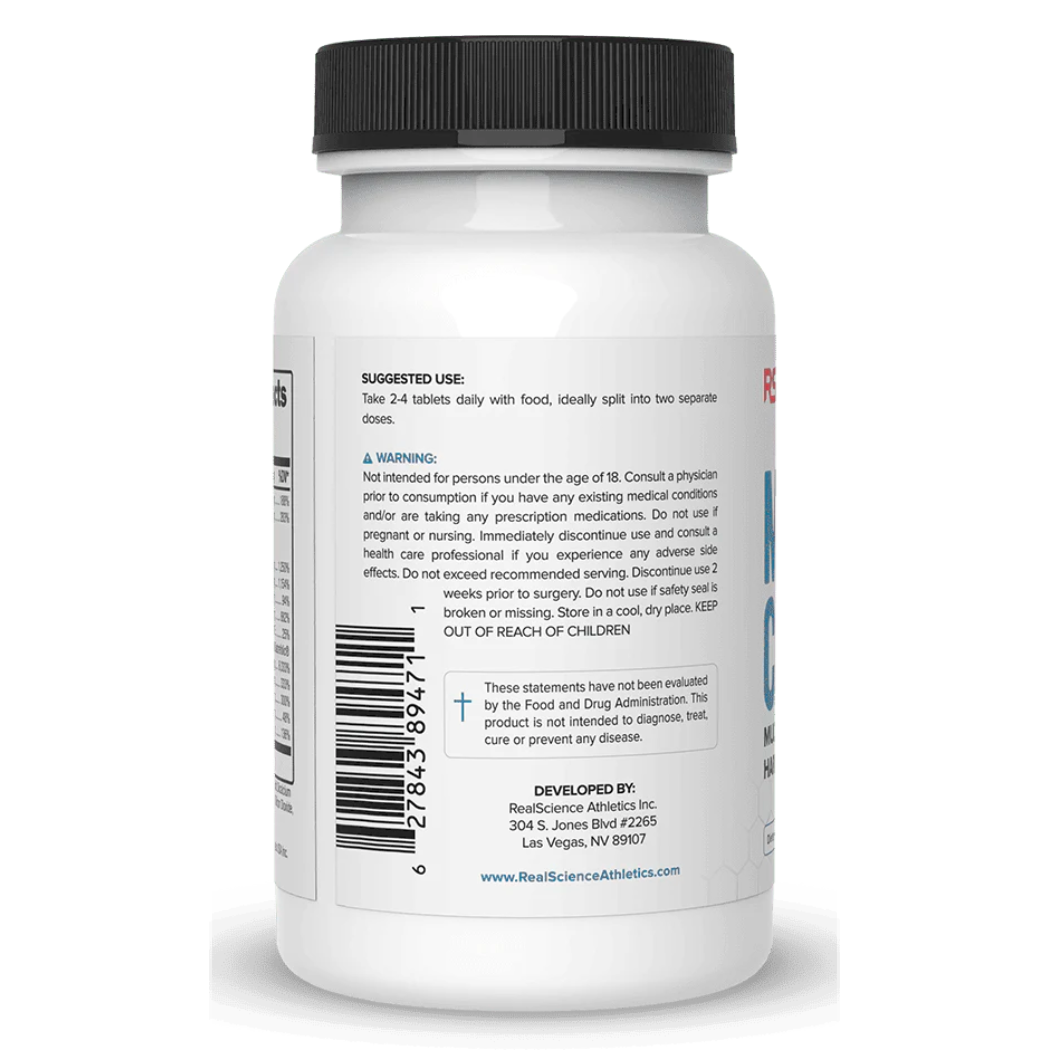
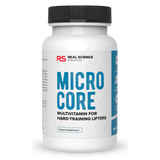
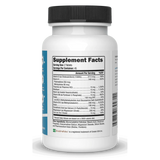
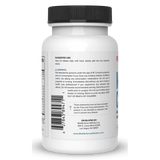
Microcore™
HIGH PERFORMANCE MULTIVITAMIN
3 Month 100% Satisfaction Money-Back Guarantee
Free Shipping On Continental US Orders Over $99
FDA Inspected Manufacturer
OR
Save An Additional 10%
When you purchase 3 or more of this product
Microcore™
PRODUCT INFO
ARE YOUR MICRONUTRIENT LEVELS OPTIMIZED?
In order for your body to build muscle, lose fat and achieve optimal health and performance, it must be provided with a wide array of individual vitamins and minerals every day.
In fact, being deficient in even a single micronutrient can literally affect thousands of different biological processes related to overall health and body composition.
This is an especially important issue for hard-training lifters and athletes, since they typically have higher vitamin and mineral requirements than the average sedentary person.
Certain micronutrients are drained from the body as a result of intense training, and some can also provide additional fitness-related benefits when consumed in slightly higher amounts.
To cover up any potential nutrient deficiencies and fully optimize vitamin and mineral intake, most lifters include a basic multivitamin as a staple in their supplement plan.
While it may seem like a no-brainer on paper, the truth is that nearly all standard multis out there – those that simply provide a long and disorganized list of every single vitamin and mineral available – are far from the best choice.
There are two major reasons for this…
THE 2 MAJOR PROBLEMS WITH MOST AVERAGE MULTIVITAMINS.
Problem #1: Low Dosages & Inferior Quality Forms.
The label on your multivitamin might look impressive because of all the various ingredients included, but dive a bit deeper and there’s an almost certain chance that you aren’t getting the proper dosage of each one.
Supplement companies know that the average consumer is mainly just responding to the marketing behind the product (rather than actually researching all the ingredients in detail), so intentionally under-dosing their formulas is an easy way to cut down production costs.
They make more money on each bottle… you get a product that may be providing little to no real benefit at all.
For example, if your multivitamin only provides 50mg of magnesium as opposed to the optimal 200-400mg dose… or 200IU of Vitamin D as opposed to 2000IU… you’ll only be receiving a small fraction of the benefits these micronutrients truly have to offer.
Not only that, but to further save on costs, most typical multis also use the cheapest and lowest quality forms of some (if not all) of the various vitamins and minerals.
It’s critical to understand that not all micronutrient forms are created equally.
Some are readily absorbed by the body in high amounts, while others are simply “flushed out” and barely utilized at all.
If you’re getting zinc oxide rather than a higher quality form such as zinc citrate, or vitamin B12 as cyanocobalamin rather than methylcobalamin (these are just two of many examples), most of that multivitamin tablet or capsule will simply be going to waste.
Problem #2: Multiple Unnecessary Ingredients.
While a “full spectrum” multivitamin seems great in theory, the reality is that you don’t actually need to be supplementing with every single vitamin and mineral in the first place.
Just because one particular micronutrient has supplemental benefits doesn’t automatically mean that every micronutrient does.
Each vitamin and mineral has different effects within the body… different applications for lifters and athletes… and can be more easily or less easily obtained in sufficient amounts from regular food.
If you’re already eating a reasonably healthy diet to support your fitness goals, a good percentage of your micronutrient needs are being covered as is.
Not only does this make supplementing with certain vitamins and minerals unnecessary from a cost perspective, but going too high on certain ones can even be detrimental to your health.
For example, getting enough vitamin A, C and E from regular food each day is typically not a problem for most people as long as they’re eating a reasonably varied diet.
Going significantly above the RDA on these vitamins likely isn’t going to benefit you, and some evidence even suggests that it can have a negative impact on training adaptations and increase mortality rates in the long term. [1-7]
Most typical multis also throw in various mineral compounds that are already present in your normal diet in easily obtainable amounts, such as chromium, iodine, selenium, copper, phosphorus, manganese and more.
Unless you have a specific reason to do so, there’s just no need to be haphazardly putting more of these minerals into your body.
Excessive selenium, for example, can increase the risk of developing type-2 diabetes, while high levels of copper have been associated with the onset and symptoms of Alzheimer’s disease. [8-11]
Bottom line?
Most typical multivitamins provide a long list of micronutrients you don’t even need in the first place (including some that are potentially dangerous), and the ones you do need are typically under-dosed and delivered in low quality forms your body can hardly absorb.
The solution?
MICROCORE™: THE KEY VITAMINS & MINERALS
HARD-TRAINING LIFTERS NEED, DELIVERED IN THEIR FULL CLINICAL DOSAGES AND HIGHEST QUALITY FORMS.
As someone who trains hard in the gym and is serious about their results, you’re already eating a reasonably varied diet that automatically provides more than enough of many individual micronutrients.
Supplementing with additional amounts of these vitamins and minerals is not only unnecessary and expensive, but it could be potentially harmful as well.
Microcore focuses on the select few micronutrients that are harder to obtain in optimal amounts from regular food and that have specific health/performance benefits when taken in slightly higher amounts.
The result is a simpler and more straightforward, yet more effective multivitamin you can trust to support your health and fitness goals.
A few of the potential benefits associated with maintaining optimal micronutrient intake include:
- Better physical performance and recovery.
- Increased energy levels and motivation.
- Improved mood and mental clarity.
- Deeper, more restful sleep.
- Optimized hormone production/libido.
- Stronger immune system function.
- Better heart health and cholesterol profile.
- Improved digestion and detoxification.
- Enhanced insulin sensitivity.
- Increased bone health.
- Greater longevity.
We spent endless hours scouring the research to determine exactly which compounds were needed to cover these targets, along with their proper clinical dosages, safety profiles and most highly absorbable forms.
We also configured the vitamin/mineral ratios in each serving to provide a baseline dosage (2 tablets per day), medium dosage (3 tablets per day) and upper dosage (4 tablets per day) so you can easily tailor the amounts based on your own personal micronutrient needs.
A “one-size-fits-all” approach is never ideal, since vitamin and mineral requirements vary depending on factors such as lean body mass, calorie intake, activity level and dietary variety.
Here’s a step by step breakdown of the individual Microcore ingredients along with the specific benefits and scientific support for each one…
INGREDIENTS
REAL SCIENCE, REAL RESULTS:
COMPLETE MICROCORE™ INGREDIENT BREAKDOWN
VITAMIN D
If there’s one single micronutrient out there that you should probably be supplementing with, vitamin D would be it.
Its overall health and fitness benefits are extremely lengthy, including strengthening the immune system, boosting cognitive function, improving mood and well-being, optimizing testosterone levels and increasing muscular strength and performance. [12-19]
However, unless you live in a warm climate and spend multiple hours a day outside in the sun, there’s a very good chance that your Vitamin D levels fall below the optimal range. [20-22]
In fact, some research indicates that as high as 25-42% of the population may be at risk for vitamin D deficiency. [23]
Although the current RDA is set at just 600IU daily, most vitamin D research specialists agree that this figure is far too low and that 1500-2000IU is the more appropriate amount for those above the age of 18. [24-27]
The risk of vitamin D toxicity is also very low, with some experts identifying as high as 10,000IU to be the safe upper limit in otherwise healthy individuals. [28]
1 SERVING OF MICROCORE (2-4 TABLETS) PROVIDES 1500IU-3000IU OF VITAMIN D IN THE BIO-AVAILABLE CHOLECALCIFEROL FORM.
MAGNESIUM
Magnesium is a co-factor in hundreds of important processes in the body and plays a key role in maintaining optimal energy production, heart health, digestion, detoxification, bone strength, mood and more.
Of specific importance to those following a muscle building and fat loss program are its effects on keeping testosterone and IGF-1 levels elevated, as well as improving muscular performance and sleep quality. [29-36]
Since magnesium is depleted from the body through sweat, those who regularly perform intensive weight training, cardio and other physical activities tend to have lower levels that can be improved through supplementation. [37-38]
Although many standard multivitamins do include magnesium in their formulas, it’s often dosed at a fraction of the recommended 200-400mg intake and/or is present in a cheaper, lower quality form such as magnesium oxide. [39-40]
1 SERVING OF MICROCORE (2-4 TABLETS) PROVIDES 200-400MG OF MAGNESIUM IN THE BIO-AVAILABLE CITRATE FORM.
ZINC
Just like magnesium, zinc is also an important mineral involved in testosterone production and immunity (along with hundreds of other processes related to overall health) and is drained from the body through sweating. [41-43]
Several studies have shown that hard-training athletes are at risk for impaired zinc status, increasing the need for additional supplementation to prevent a potential deficiency. [44-46]
Although zinc oxide is a commonly used form in many popular multivitamins due to its low cost, its bio-availability in humans is quite low to where only a minimal amount may actually be absorbed. [47]
1 SERVING OF MICROCORE (2-4 TABLETS) PROVIDES 15-30MG OF ZINC IN THE BIO-AVAILABLE CITRATE FORM.
VITAMIN B COMPLEX
The B Vitamins include B1 (thiamin), B2 (riboflavin), B3 (niacin), B5 (pantothenic acid), B6 (pyridoxine), B7 (biotin), B9 (folate) and B12 (cobalamin).
They play a critical role in converting food into usable energy and aid in an endless number of important biological processes related to the immune system, hormone production, cognition, growth/repair of cells and much more.
Although they can be found in abundance in whole foods, some data suggests that intense physical activity increases B vitamin requirements and that some athletes may have less than optimal levels. [48-57]
Given the possibility of an additional health/performance benefit and the minimal impact on cost, we decided to add a basic B Complex into the formula to ensure that all your bases are fully covered while still staying well within safe limits.
1 SERVING OF MICROCORE (2-4 TABLETS) PROVIDES A RESEARCH-SUPPORTED DOSE OF ALL 8 B VITAMINS IN THEIR HIGHEST QUALITY FORMS. (SEE LABEL FOR DETAILS)
VITAMIN K
Vitamin K is an often overlooked yet highly valuable compound that refers to two different structures known as phylloquinones (K1) and menaquinones (K2).
Although the standard RDA (75mcg) is sufficient for basic health, research has shown that higher amounts of Vitamin K above this level provide dose-dependent benefits for cardiovascular health, bone strength, insulin sensitivity and overall longevity. [58-62]
Obtaining these levels through food alone is often very difficult (unless you regularly eat fermented soy), making additional supplementation a smart option for both gym-goers and sedentary individuals alike. [63-65]
The risk of Vitamin K toxicity is practically non-existent, with amounts as high as 45,000mcg being demonstrated as safe over the long term. [66]
1 SERVING OF MICROCORE (2-4 TABLETS) PROVIDES 250-500MCG OF VITAMIN K1 (AS PHYTONADIONE) AND 90-180MCG OF VITAMIN K2 (AS MK-7) PER SERVING.
MICROCORE™: THE BOTTOM LINE
If you’re looking to build muscle, lose fat, gain strength and optimize your overall health and well-being, maintaining proper micronutrient intake is critical.
Microcore delivers a pharmaceutical grade, research-supported dose of the most important vitamins and minerals for hard-training lifters, all in their most bio-available forms for maximum absorption.
Rather than throwing in an endless list of cheap, under-dosed, unnecessary and possibly even dangerous ingredients like most standard multis do, Microcore puts all of the focus on quality (not quantity) by providing the exact micronutrients you need and discarding all the useless filler.
The end result is a premium quality, scientifically-sound multivitamin to safely and effectively support your health and fitness goals.
Your results are our #1 priority. That’s why you’ll only pay for our products if you’re 100% satisfied with them.
If you purchase a RealScience supplement and are unhappy with it for any reason, just let us know and we’ll promptly refund your entire purchase.
You don’t even need to go through the hassle of returning the item to us. You can simply keep the product, and we part as friends.
Very few companies will offer a guarantee like this, but we truly value our customers and know that the quality and effectiveness of our supplements stands on its own.
(To protect ourselves from people abusing the refund policy, this guarantee applies to first-time purchases made within 3 months and is valid on a single bottle of each product. If you purchased more than one bottle and would like a complete refund then it’s required that the additional units be sent back to us so we can re-add them to our inventory.)
SUPPLEMENT FACTS / SUGGESTED USE
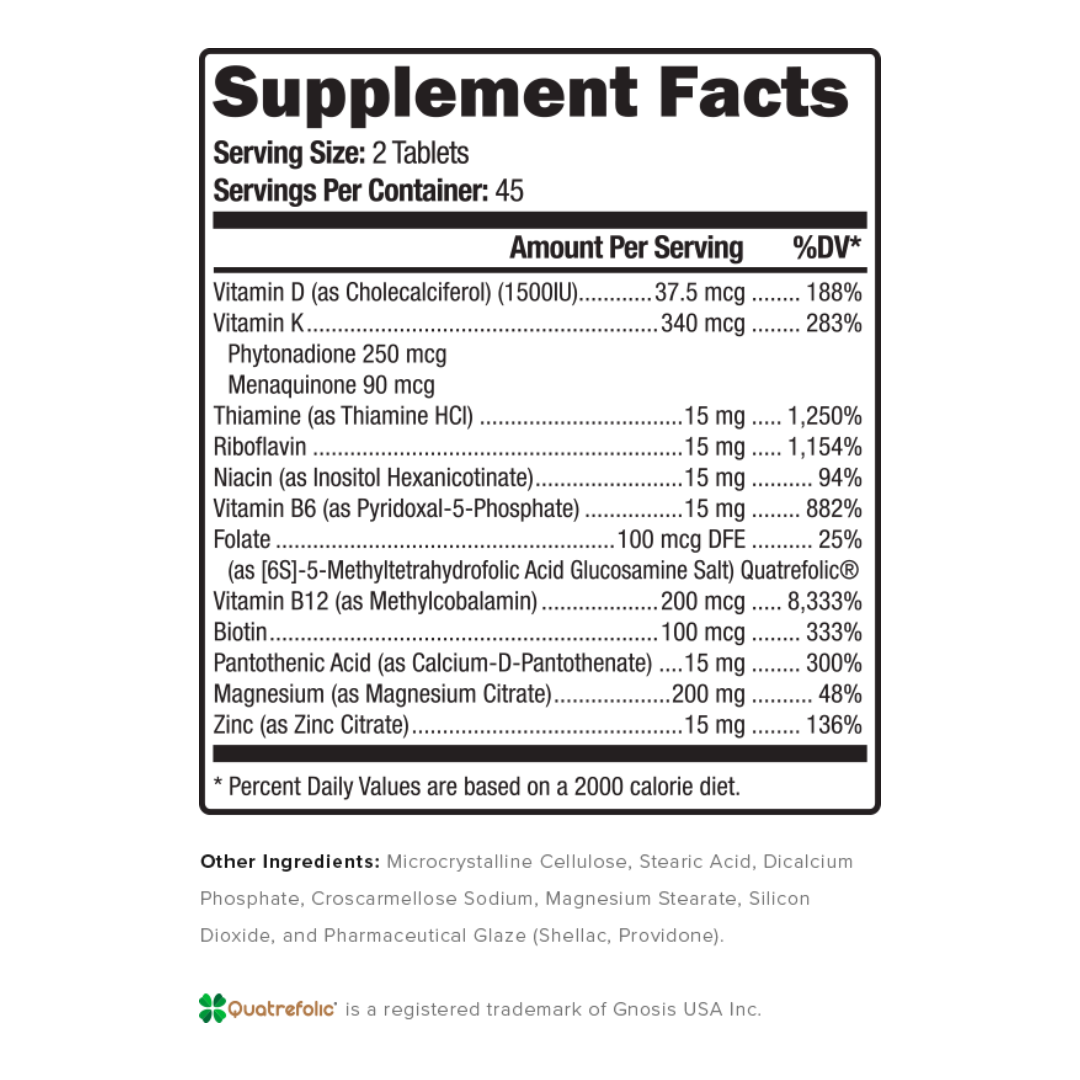
Take 2-4 Tablets daily with food, ideally split into two separate doses.
WARNING
Not intended for persons under the age of 18. Consult a physician prior to consumption if you have any existing medical conditions and/or are taking any prescription medications. Do not use if pregnant or nursing. Immediately discontinue use and consult a health care professional if you experience any adverse side effects. Do not exceed recommended serving. Discontinue use 2 weeks prior to surgery. Do not use if safety seal is broken or missing. Store in a cool, dry place.
KEEP OUT OF REACH OF CHILDREN.
*These statements have not been evaluated by the Food and Drug Administration. This product is not intended to diagnose, treat, cure or prevent any disease.
VERIFIED CUSTOMER REVIEWS
- BobbyRated 5 out of 5 stars4 days ago5 Stars
I like them a lot, I just ran out and took some time to pre-order. Thanks.
Was this helpful? - ded l.Verified BuyerRated 5 out of 5 stars3 months ago5 Stars
Pros: Hits all the important vitamins/minerals that usually go under consumed by most people. It also has a nice price for what you are getting, it is hard to find a multivitamin that not only has great dosage but also has all the best forms for the vitamins/minerals themselves.
Cons: It is missing other vitamins/minerals that the body does need but people usually do not need to supplement with them because of how easy you can get them in your diet. The vitamin D only has 1500IU's per serving, could have been a little higher.
Overall: 9.5/10 Best multivitamin you could buy, you really aren't gonna find anything better.
Other Notes: The pills are not huge but for people who do not like taking pills, they are a little big measuring 13/16ths long and 5/16ths wide.
Was this helpful? - ded l.Verified BuyerRated 5 out of 5 stars3 months ago5 Stars
solid product
Was this helpful? - Rashed A.Verified BuyerRated 5 out of 5 stars4 months ago5 Stars
This multivitamin seems to complement the lifting lifestyle very well. I feel generally well-balanced while taking it, with consistent energy levels (that allow my to prioritize and execute my program, which I've learned creates the bedrock for an emotionally satisfying life).
I did a lot of research on just what are the bread-and-butter vitamins and minerals that would bolster and support my natural bodybuilding journey, and Microcore has all those. However, even though it has magnesium in it, I found that I still needed to supplement my diet with further magnesium from another manufacturer to hit my personal "sweet spot." Perhaps it does what it needs to for other lifters, but I would've liked it more if it had a greater quantity of magnesium.
Overall, this multivitamin has securely earned its place in my regimen of supplements (that includes fish oil, ashwagandha, etc.).
Was this helpful? - Kenneth B.Rated 5 out of 5 stars7 months ago5 Stars
There are too many multi-vitamin supplements out there with too many ingredients, that it's overwhelming. I like the clean, simplified formulation of Microcore and will continue to use it.
Was this helpful?

Your results are our #1 priority. That’s why you’ll only pay for our products if you’re 100% satisfied with them. If you purchase a RealScience supplement and are unhappy with it for any reason, just let us know and we’ll promptly refund your entire purchase. You don’t even need to go through the hassle of returning the item to us. You can simply keep the product, and we part as friends. Very few companies will offer a guarantee like this, but we truly value our customers and know that the quality and effectiveness of our supplements stands on its own.(To protect ourselves from people abusing the refund policy, this guarantee applies to first-time purchases made within 3 months and is valid on a single bottle of each product. If you purchased more than one bottle and would like a complete refund then it’s required that the additional units be sent back to us so we can re-add them to our inventory.)
FREQUENTLY ASKED QUESTIONS
I’VE HEARD FROM MANY SOURCES THAT MULTIVITAMINS ARE UNNECESSARY. WHAT GIVES?
If we’re talking about most “traditional” multis that include a laundry-list of every single vitamin and mineral available randomly mashed together into a single formula, then we completely agree that these are unnecessary.
As long as you’re eating a half-decent diet with reasonable food variety throughout the day, a good portion of your micronutrient needs are already being met, making additional supplementation unnecessary.
That said, there are several micronutrients that are much more difficult to consume in optimal amounts from regular whole food and/or whose requirements are increased as a result of intense physical exercise.
For example, magnesium and zinc are drained from the body through sweat.
Vitamin D is primarily obtained through direct sunlight, which most people don’t get enough of.
Vitamin K2 is only found in high amounts in fermented soy.
This is where Microcore places its focus by providing only the select few vitamins and minerals you truly need, in their proper clinical doses and most bio-available forms.
WHAT SPECIFIC EFFECTS WILL I FEEL BY TAKING MICROCORE?
Some benefits of Microcore can be directly “felt”, while others provide overall long-term health benefits that work more “beneath the hood” and won’t be quite as obvious.
Examples of benefits that you may directly feel include improvements in mood and well-being, increased energy, mental clarity, better sleep and improved libido.
Just how strongly these effects are experienced largely depends on your individual micronutrient levels prior to supplementation. If a particular vitamin or mineral in Microcore helps to correct a significant deficiency you may have had, the benefits will be more noticeable.
Examples of health benefits that you won’t necessarily “feel” but may experience symptoms of longer term include stronger immune function, heart health, bone health, hormone production and insulin sensitivity.
SOME OF THE DOSAGES ARE QUITE A BIT HIGHER THAN THE STANDARD RDA. WHY IS THAT?
While the RDA can provide a useful guideline for the maintenance of basic overall health, going above the RDA in certain cases (while still remaining within safe limits) can produce additional dose-dependent benefits that the RDA alone won’t provide.
A good example of this is Vitamin K. Although 75mcg daily is sufficient to prevent a deficiency, going significantly higher than this (Microcore contains up to 680mcg per serving) directly improves bone strength and cardiovascular health while still staying well within the known safe limit of 45,000mcg.
Some RDA’s are also currently set at levels that are likely too low for optimal health.
For example, the current RDA for Vitamin D is only 600IU, while many experts who specialize in Vitamin D research agree that 1500-2000IU is the more appropriate minimum figure.
In addition, hard-training lifters and athletes often have higher micronutrient requirements than the average person since certain vitamins and minerals (for example, magnesium, zinc and b vitamins) are drained from the body as a result of intense exercise.
DON’T SEVERAL OF THE VITAMINS/MINERALS COMPETE FOR ABSORPTION WHEN TAKEN AT THE SAME TIME?
Although zinc and magnesium technically do utilize the same transporter, they only “compete” for absorption at higher combined intakes of 800mg or more.
The highest dose of Microcore (4 tablets daily) provides 400mg of magnesium and 30mg of zinc, well below the 800mg limit.
I ALREADY EAT A HEALTHY DIET WITH PLENTY OF VARIETY. WILL MICROCORE BENEFIT ME?
Microcore has been formulated to provide the specific vitamins and minerals that are the most difficult to obtain in optimal amounts from regular whole food and that hard-training lifters require the most.
For example, vitamin D is only found in whole foods in very small amounts and must either be obtained through direct sunlight or in supplemental form.
Vitamin K2 would be another example. Unless you regularly eat an uncommon food source known as “natto” (fermented soy), additional supplementation can provide dose-dependent benefits.
While Microcore will certainly provide the greatest benefit to those with a less micronutrient rich diet, even those who are already eating quite “healthy” can still use it to ensure that all of their vitamin/mineral levels are fully optimized.
WHY IS THERE NO VITAMIN A, VITAMIN C OR VITAMIN E INCLUDED?
Most people eating a typical Western diet already meet their requirements for these vitamins quite easily.
Vitamin A, C and E are not only unnecessary from a cost perspective in most cases, but some evidence even suggests that there may be negative health effects associated with high dose supplementation of these antioxidants over the long term. [1-7]
So, unless you have a specific reason for consuming additional vitamin A, C or E, including them in a multivitamin is at best a waste of money and at worst potentially harmful.
WHY IS THERE NO CALCIUM INCLUDED?
Daily calcium intakes can vary quite a bit from person to person, primarily depending on whether or not they consume dairy products.
Those who regularly eat foods such as yogurt, milk, cheese or whey protein likely get more than enough calcium from their diet, while those who exclude dairy may benefit from supplementation.
Due to this significant dietary variance, calcium is best supplemented with on an “as needed” basis only if it’s required to help an individual meet the recommended intake of about 1000mg daily.
SEVERAL OTHER COMMON MINERALS SEEM TO BE EXCLUDED AS WELL. WHY?
Although other minerals such as chromium, iodine, phosphorus, selenium, copper, manganese etc. are commonly found in most traditional multis, the average person already obtains enough of them through their regular diet rendering additional supplementation unnecessary and potentially unsafe.
Excessive selenium, for example, can increase the risk of developing type-2 diabetes, while high levels of copper have been associated with the onset and symptoms of Alzheimer’s disease. [8-11]
Just because you should be supplementing with one particular micronutrient doesn’t automatically mean that you should be supplementing with every micronutrient.
Microcore focuses only on the specific vitamins and minerals that hard-training lifters truly require and discards all of the unnecessary extras.
HOW DO I KNOW THAT MICROCORE DOESN'T INCLUDE ANY CHEAP FILLERS OR HIDDEN INGREDIENTS LIKE OTHER COMPANIES HAVE BEEN FOUND USING?
Product safety and control is a top priority, and that’s why we only manufacture our supplements in cGMP/NSF certified USA-based facilities. This is the most widely-respected global third-party certification provider for supplement production.
It costs a bit more on our end to go this route, but guarantees that you’re getting the purest ingredients and highest quality processing available.
WHAT IS THE BEST WAY TO SUPPLEMENT WITH MICROCORE IN TERMS OF DOSAGE AND TIMING?
Microcore should be supplemented with on a daily basis at 2-4 tablets per day. This should ideally be split into two dosages taken in the morning and afternoon with food.
Whether you go with the baseline dosage (2 tablets), medium dosage (3 tablets) or upper dosage (4 tablets) depends on your individual micronutrient needs.
Every person is different and has higher or lower requirements depending on a variety of factors, including:
Body Weight: Heavier individuals carrying more total lean body mass will generally have higher needs than lighter individuals.
Calorie Intake: Eating in a calorie deficit for fat loss would increase the need for micronutrient supplementation in comparison to eating at maintenance or in a surplus.
Activity Level: Those who are more active throughout the week (including weight training, cardio and any other strenuous activities) would likely benefit from a higher dosage.
Dietary Variety: If you tend to eat a smaller variety of foods throughout the day (especially if your fruit/vegetable intake is fairly low) then your vitamin/mineral requirements would increase.
Use a combination of the above factors to decide which specific dosage to follow.
If you’re unsure, just go with the middle-ground dosage of 3 tablets per day.
HOW LARGE ARE THE TABLETS?
Don’t worry, these are not massive “horse pills” like you get with many other multivitamin products. Microcore is delivered in a small sized caplet and contains an outer coating to allow for easy swallowing.
ARE THERE ANY SIDE EFFECTS I SHOULD KNOW ABOUT?
All of the ingredients in Microcore are present in research-supported dosages that have been shown to be safe for both short and long-term use.
However, if you have any pre-existing health conditions or are currently using any prescription medication, you should consult your doctor first before supplementing with Microcore.
Those using the prescription medication Warfarin should avoid Microcore due to interactions with Vitamin K.
IS MICROCORE GLUTEN-FREE? VEGETARIAN? VEGAN?
Yes, yes and yes!
WHAT ARE YOUR SCIENTIFIC REFERENCES?
1.Antioxidants prevent health-promoting effects of physical exercise in humans.
Ristow M, Zarse K, Oberbach A, Klöting N, Birringer M, Kiehntopf M, Stumvoll M, Kahn CR, Blüher M. Proc Natl Acad Sci U S A. 2009 May 26;106(21):8665-70.
2.Oral administration of vitamin C decreases muscle mitochondrial biogenesis and hampers training-induced adaptations in endurance performance.
Gomez-Cabrera MC, Domenech E, Romagnoli M, Arduini A, Borras C, Pallardo FV, Sastre J, Viña J. Am J Clin Nutr. 2008 Jan;87(1):142-9.
3.The Effect of Vitamin C and E Supplementation on Muscle Damage and Oxidative Stress in Female Athletes: A Clinical Trial.
Maryam Taghiyar, Leila Darvishi, Gholamrez Askari, Awat Feizi, Mitra Hariri,Nafiseh Shokri Mashhadi, Reza Ghiasvand. Int J Prev Med. 2013 Apr; 4(Suppl 1): S16–S23.
4.Mortality in randomized trials of antioxidant supplements for primary and secondary prevention: systematic review and meta-analysis.
Bjelakovic G, Nikolova D, Gluud LL, Simonetti RG, Gluud C. JAMA. 2007 Feb 28;297(8):842-57.
5.Antioxidant supplements for prevention of mortality in healthy participants and patients with various diseases.
Cochrane Database Syst Rev. 2012 Mar 14;(3):CD007176.
6.Antioxidant supplements and mortality.
Bjelakovic G, Nikolova D, Gluud C. Curr Opin Clin Nutr Metab Care. 2014 Jan;17(1):40-4.
7.Antioxidant vitamins supplementation and mortality: a randomized trial in head and neck cancer patients.
Bairati I, Meyer F, Jobin E, Gélinas M, Fortin A, Nabid A, Brochet F, Têtu B. Int J Cancer. 2006 Nov 1;119(9):2221-4.
8.Serum selenium concentrations and diabetes in U.S. adults: National Health and Nutrition Examination Survey (NHANES) 2003-2004.
Laclaustra M, Navas-Acien A, Stranges S, Ordovas JM, Guallar E. Environ Health Perspect. 2009 Sep;117(9):1409-13.
9.Effects of long-term selenium supplementation on the incidence of type 2 diabetes: a randomized trial.
Stranges S, Marshall JR, Natarajan R, Donahue RP, Trevisan M, Combs GF, Cappuccio FP, Ceriello A, Reid ME. Ann Intern Med. 2007 Aug 21;147(4):217-23. Epub 2007 Jul 9.
10.Low-copper diet as a preventive strategy for Alzheimer's disease.
Squitti R, Siotto M, Polimanti R. Neurobiol Aging. 2014 Sep;35 Suppl 2:S40-50
11.Dietary and lifestyle guidelines for the prevention of Alzheimer's disease.
Barnard ND, Bush AI, Ceccarelli A, Cooper J, de Jager CA, Erickson KI, Fraser G, Kesler S, Levin SM, Lucey B, Morris MC, Squitti R. Neurobiol Aging. 2014 Sep;35 Suppl 2:S74-8.
12.Effects of Vitamin D Supplementation on Muscle Strength in Athletes: A Systematic Review.
Chiang CM, Ismaeel A, Griffis RB, Weems S. J Strength Cond Res. 2017 Feb;31(2):566-574.
13.Vitamin D Status and Muscle Function Among Adolescent and Young Swimmers.
Geiker NRW, Larsen R, Hansen M, Jørgensen NR, Jakobsen J, Hansen BS, Kristensen M, Bügel S. Int J Sport Nutr Exerc Metab. 2017 May 30:1-22.
14.Muscular effects of vitamin D in young athletes and non-athletes and in the elderly.
Koundourakis NE, Avgoustinaki PD, Malliaraki N, Margioris AN. Hormones (Athens). 2016 Oct;15(4):471-488.
15.Sports health benefits of vitamin D.
Shuler FD, Wingate MK, Moore GH, Giangarra C. Sports Health. 2012 Nov;4(6):496-501.
16.Compromised Vitamin D Status Negatively Affects Muscular Strength and Power of Collegiate Athletes.
Hildebrand RA, Miller B, Warren A, Hildebrand D, Smith BJ. Int J Sport Nutr Exerc Metab. 2016 Dec;26(6):558-564.
17.Vitamin D supplementation in athletes.
Larson-Meyer E. Nestle Nutr Inst Workshop Ser. 2013;75:109-21.
18.Selected In-Season Nutritional Strategies to Enhance Recovery for Team Sport Athletes: A Practical Overview.
Heaton LE, Davis JK, Rawson ES, Nuccio RP, Witard OC, Stein KW, Baar K, Carter JM, Baker LB. Sports Med. 2017 Jul 12.
19.The impact of 1-year vitamin D supplementation on vitamin D status in athletes: a dose-response study.
Backx EM, Tieland M, Maase K, Kies AK, Mensink M, van Loon LJ, de Groot LC. Eur J Clin Nutr. 2016 Sep;70(9):1009-14. doi: 10.1038/ejcn.2016.133.
20.Vitamin D Deficiency Among Professional Basketball Players.
Fishman MP, Lombardo SJ, Kharrazi FD. Orthop J Sports Med. 2016 Jul 6;4(7):2325967116655742.
21.Vitamin D and Weight Cycling: Impact on Injury, Illness, and Inflammation in Collegiate Wrestlers.
Barcal JN1, Thomas JT, Hollis BW, Austin KJ, Alexander BM, Larson-Meyer DE. Nutrients. 2016 Nov 30;8(12). pii: E775.
22.Vitamin D Status: United States, 2001–2006.
Anne C. Looker, Ph.D.; Clifford L. Johnson, M.P.H.; David A. Lacher, M.D.; Christine M. Pfeiffer, Ph.D.; Rosemary L. Schleicher, Ph.D.; and Christopher T. Sempos, Ph.D.
23.Prevalence and correlates of vitamin D deficiency in US adults.
Forrest KY, Stuhldreher WL. Nutr Res. 2011 Jan;31(1):48-54.
24.Why the IOM recommendations for vitamin D are deficient.
Heaney RP, Holick MF. J Bone Miner Res. 2011 Mar;26(3):455-7.
25.The 2011 report on dietary reference intakes for calcium and vitamin D from the Institute of Medicine: what clinicians need to know.
Ross AC, Manson JE, Abrams SA, Aloia JF, Brannon PM, Clinton SK, Durazo-Arvizu RA, Gallagher JC, Gallo RL, Jones G, Kovacs CS, Mayne ST, Rosen CJ, Shapses SA. J Clin Endocrinol Metab. 2011 Jan;96(1):53-8.
26.Evaluation, treatment, and prevention of vitamin D deficiency: an Endocrine Society clinical practice guideline.
Holick MF1, Binkley NC, Bischoff-Ferrari HA, Gordon CM, Hanley DA, Heaney RP, Murad MH, Weaver CM; Endocrine Society. J Clin Endocrinol Metab. 2011 Jul;96(7):1911-30.
27.Should we be concerned about the vitamin D status of athletes?
Willis KS1, Peterson NJ, Larson-Meyer DE. Int J Sport Nutr Exerc Metab. 2008 Apr;18(2):204-24.
28.Vitamin D supplementation, 25-hydroxyvitamin D concentrations, and safety.
Vieth R. m J Clin Nutr. 1999 May;69(5):842-56.
29.Can Magnesium Enhance Exercise Performance?
Zhang Y, Xun P, Wang R, Mao L, He K. Nutrients. 2017 Aug 28;9(9).
30.Effects of magnesium supplementation on testosterone levels of athletes and sedentary subjects at rest and after exhaustion.
Cinar V, Polat Y, Baltaci AK, Mogulkoc R. Biol Trace Elem Res. 2011 Apr;140(1):18-23.
31.Magnesium and anabolic hormones in older men.
Maggio M, Ceda GP, Lauretani F, Cattabiani C, Avantaggiato E, Morganti S, Ablondi F, Bandinelli S, Dominguez LJ, Barbagallo M, Paolisso G, Semba RD, Ferrucci L. Int J Androl. 2011 Dec;34(6 Pt 2):e594-600.
32.The effect of magnesium supplementation on primary insomnia in elderly: A double-blind placebo-controlled clinical trial.
Abbasi B, Kimiagar M, Sadeghniiat K, Shirazi MM, Hedayati M, Rashidkhani B. J Res Med Sci. 2012 Dec;17(12):1161-9.
33.Magnesium and strength in elite judo athletes according to intracellular water changes.
Matias CN, Santos DA, Monteiro CP, Silva AM, Raposo Mde F, Martins F, Sardinha LB, Bicho M, Laires MJ. Magnes Res. 2010 Sep;23(3):138-41.
34.Magnesium, zinc, and chromium nutrition and athletic performance.
Lukaski HC. Can J Appl Physiol. 2001;26 Suppl:S13-22.
35.Magnesium intake is associated with strength performance in elite basketball, handball and volleyball players.
Santos DA, Matias CN, Monteiro CP, Silva AM, Rocha PM, Minderico CS, Bettencourt Sardinha L, Laires MJ. Magnes Res. 2011 Dec;24(4):215-9.
36.Magnesium status and the physical performance of volleyball players: effects of magnesium supplementation.
Setaro L, Santos-Silva PR, Nakano EY, Sales CH, Nunes N, Greve JM, Colli C.
37.Exercise, magnesium and immune function.
Laires MJ, Monteiro C. Magnes Res. 2008 Jun;21(2):92-6.
38.Zinc, iron, and magnesium status in athletes--influence on the regulation of exercise-induced stress and immune function.
König D, Weinstock C, Keul J, Northoff H, Berg A. Exerc Immunol Rev. 1998;4:2-21.
39.Mg citrate found more bioavailable than other Mg preparations in a randomised, double-blind study.
Walker AF1, Marakis G, Christie S, Byng M. Magnes Res. 2003 Sep;16(3):183-91.
40.Magnesium bioavailability from magnesium citrate and magnesium oxide.
Lindberg JS, Zobitz MM, Poindexter JR, Pak CY. J Am Coll Nutr. 1990 Feb;9(1):48-55.
41.Zinc loss in sweat of athletes exercising in hot and neutral temperatures.
Tipton K, Green NR, Haymes EM, Waller M. Int J Sport Nutr. 1993 Sep;3(3):261-71.
42.The effect of exhaustion exercise on thyroid hormones and testosterone levels of elite athletes receiving oral zinc.
Kilic M, Baltaci AK, Gunay M, Gökbel H, Okudan N, Cicioglu I. Neuro Endocrinol Lett. 2006 Feb-Apr;27(1-2):247-52.
43.Zinc status and serum testosterone levels of healthy adults.
Prasad AS, Mantzoros CS, Beck FW, Hess JW, Brewer GJ. Nutrition. 1996 May;12(5):344-8.
44.Evidence of zinc deficiency in competitive swimmers.
Giolo De Carvalho F, Rosa FT, Marques Miguel Suen V, Freitas EC, Padovan GJ, Marchini JS. Nutrition. 2012 Nov-Dec;28(11-12):1127-31.
45.Zinc status in athletes: relation to diet and exercise.
Micheletti A, Rossi R, Rufini S. Sports Med. 2001;31(8):577-82.
46.Zinc metabolism in the athlete: influence of training, nutrition and other factors.
Couzy F, Lafargue P, Guezennec CY. Int J Sports Med. 1990 Aug;11(4):263-6.
47.Zinc absorption by young adults from supplemental zinc citrate is comparable with that from zinc gluconate and higher than from zinc oxide.
Wegmüller R, Tay F, Zeder C, Brnic M, Hurrell RF. J Nutr. 2014 Feb;144(2):132-6.
48.B-vitamins and exercise: does exercise alter requirements?
Woolf K, Manore MM. Int J Sport Nutr Exerc Metab. 2006 Oct;16(5):453-84.
49.Effect of physical activity on thiamine, riboflavin, and vitamin B-6 requirements.
Melinda M Manore. Am J Clin Nutr August 2000 vol. 72 no. 2 598s-606s.
50.Micronutrient Intakes in 553 Dutch Elite and Sub-Elite Athletes: Prevalence of Low and High Intakes in Users and Non-Users of Nutritional Supplements.
Wardenaar F, Brinkmans N, Ceelen I, Van Rooij B, Mensink M, Witkamp R, De Vries J Nutrients. 2017 Feb 15;9(2). pii: E142.
51.Nutritional habits among high-performance endurance athletes.
Baranauskas M, Stukas R, Tubelis L, Žagminas K, Šurkienė G, Švedas E, Giedraitis VR, Dobrovolskij V, Abaravičius JA. Medicina (Kaunas). 2015;51(6):351-62.
52.Nutritional practices of elite athletes. Practical recommendations.
Economos CD, Bortz SS, Nelson ME. Sports Med. 1993 Dec;16(6):381-99.
53.Treatment of depression: time to consider folic acid and vitamin B12.
Coppen A, Bolander-Gouaille C. J Psychopharmacol. 2005 Jan;19(1):59-65.
54.B-vitamins reduce the long-term risk of depression after stroke.
Almeida OP, Marsh K, Alfonso H, Flicker L, Davis TM, Hankey GJ. Ann Neurol. 2010 Oct;68(4):503-10. doi: 10.1002/ana.22189.
55.Oral folic acid and vitamin B-12 supplementation to prevent cognitive decline in community-dwelling older adults with depressive symptoms--the Beyond Ageing Project: a randomized controlled trial.
Walker JG, Batterham PJ, Mackinnon AJ, Jorm AF, Hickie I, Fenech M, Kljakovic M, Crisp D, Christensen H, Am J Clin Nutr. 2012 Jan;95(1):194-203
56.Plasma vitamin B-12 concentrations relate to intake source in the Framingham Offspring study.
Tucker KL, Rich S, Rosenberg I, Jacques P, Dallal G, Wilson PW, Selhub J, Am J Clin Nutr. 2000 Feb;71(2):514-22.
57.Cobalamin.
Markle HV, Crit Rev Clin Lab Sci. 1996;33(4):247-356.
58.Improved bone metabolism in female elite athletes after vitamin K supplementation.
Craciun AM, Wolf J, Knapen MH, Brouns F, Vermeer C. Int J Sports Med. 1998 Oct;19(7):479-84.
59.Three-year low-dose menaquinone-7 supplementation helps decrease bone loss in healthy postmenopausal women.
Knapen MH, Drummen NE, Smit E, Vermeer C, Theuwissen E. Osteoporos Int. 2013 Sep;24(9):2499-507.
60.Vitamin K2 Supplementation Improves Insulin Sensitivity via Osteocalcin Metabolism: A Placebo-Controlled Trial.
Hyung Jin Choi, MD, Juyoun Yu, BS, Hosanna Choi, BS, Jee Hyun An, MD, Sang Wan Kim, MD, PHD, Kyong Soo Park, MD, PHD, Hak C. Jang, MD, PHD, Seong Yeon Kim, MD, PHD and Chan Soo Shin, MD, PHD. Diabetes Care 2011 Sep; 34(9): e147-e147.
61.Dietary intake of vitamin K is inversely associated with mortality risk.
Geleijnse JM1, Vermeer C, Grobbee DE, Schurgers LJ, Knapen MH, van der Meer IM, Hofman A, Witteman JC. J Nutr. 2004 Nov;134(11):3100-5.
62.Dietary intake of menaquinone is associated with a reduced risk of coronary heart disease: the Rotterdam Study.
Geleijnse JM1, Vermeer C, Grobbee DE, Schurgers LJ, Knapen MH, van der Meer IM, Hofman A, Witteman JC. J Nutr. 2004 Nov;134(11):3100-5.
63.A high phylloquinone intake is required to achieve maximal osteocalcin gamma-carboxylation.
Binkley NC, Krueger DC, Kawahara TN, Engelke JA, Chappell RJ, Suttie JW. Institute on Aging, Department of Medicine, University of Wisconsin, Madison. Am J Clin Nutr. 2002 Nov;76(5):1055-60.
64.A high menaquinone intake reduces the incidence of coronary heart disease.
Gast GC, de Roos NM, Sluijs I, Bots ML, Beulens JW, Geleijnse JM, Witteman JC, Grobbee DE, Peeters PH, van der Schouw YT. Nutr Metab Cardiovasc Dis. 2009 Sep;19(7):504-10.
65.Time-dependent effects of vitamin K2 (menatetrenone) on bone metabolism in postmenopausal women.
Ozuru R, Sugimoto T, Yamaguchi T, Chihara K. Endocr J. 2002 Jun;49(3):363-70.
66.A longitudinal study of the effect of vitamin K2 on bone mineral density in postmenopausal women a comparative study with vitamin D3 and estrogen-progestin therapy.
Iwamoto I, Kosha S, Noguchi S, Murakami M, Fujino T, Douchi T, Nagata Y. Maturitas. 1999 Jan 4;31(2):161-4.
- Related products
- Recently viewed

